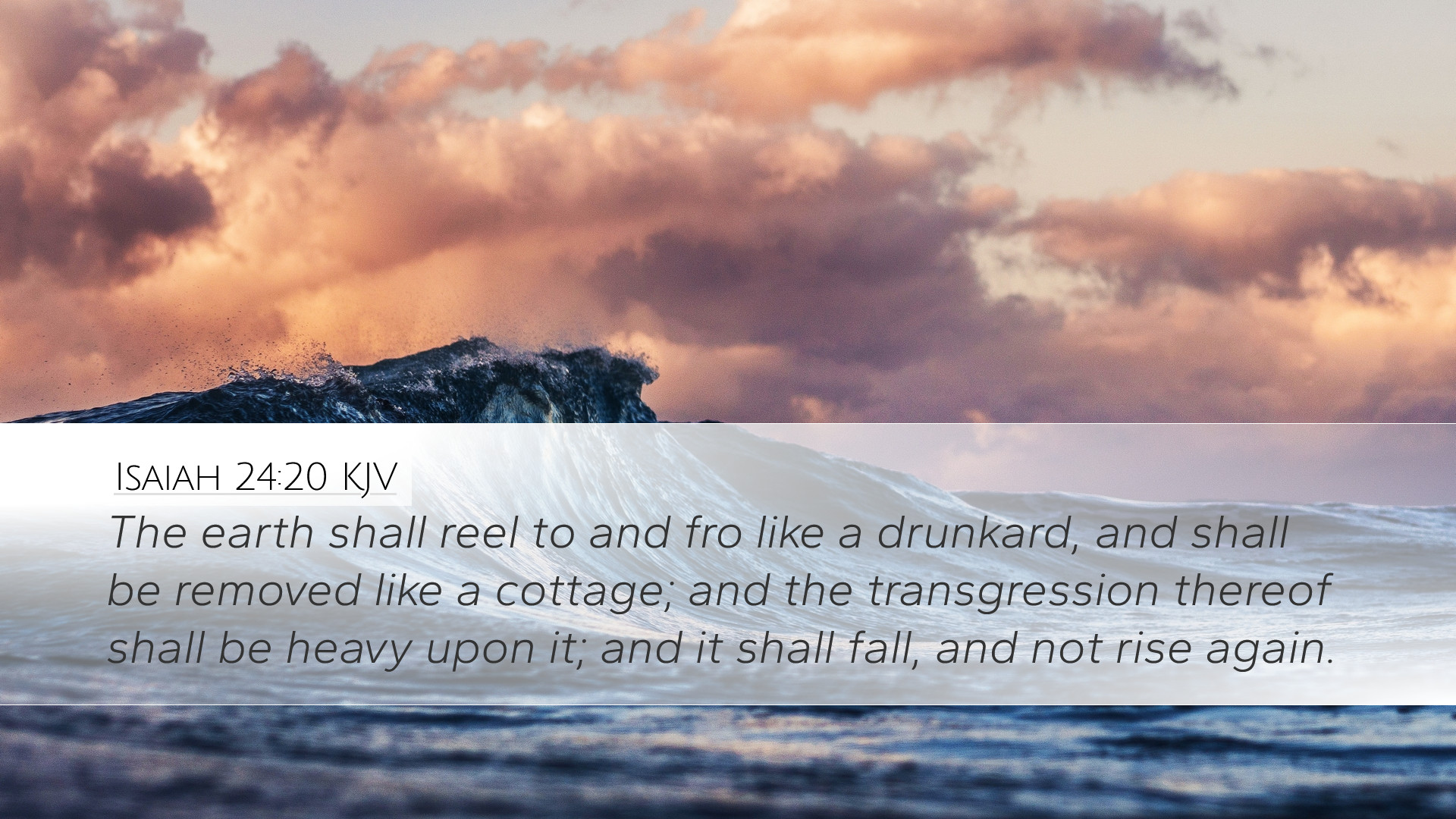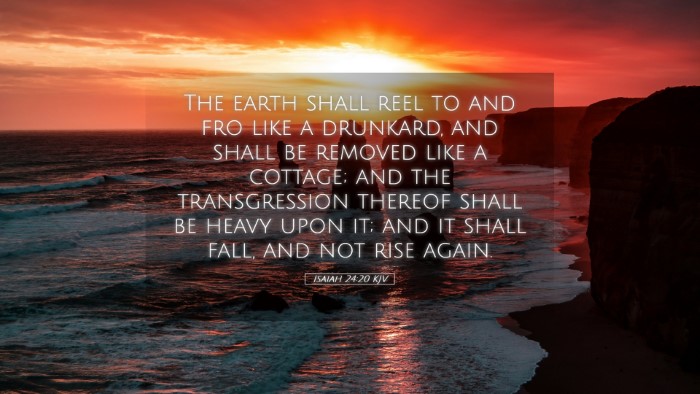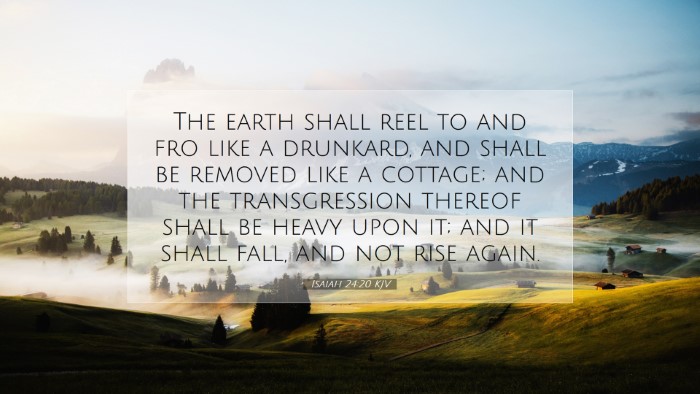Commentary on Isaiah 24:20
Isaiah 24:20 reads: "The earth shall reel to and fro like a drunkard, and shall be removed like a cottage; and the transgression thereof shall be heavy upon it; and it shall fall, and not rise again." This verse vividly captures the profound upheaval and chaos awaiting the earth as a consequence of human transgression. Through the insights of renowned public domain commentators such as Matthew Henry, Albert Barnes, and Adam Clarke, we can further explore the depth of meaning contained in this single scripture.
Contextual Overview
The context of Isaiah 24 brings attention to a prophetic vision describing the impending judgment of God over the earth, particularly in relation to the sins of humanity. Chapter 24 outlines the devastation that befalls nations and the earth due to the weight of iniquity. It portrays cosmic and terrestrial signs of divine wrath, highlighting God's sovereignty amidst chaos.
The Earth’s Reeling: An Interpretation
In this verse, the imagery of the earth reeling "to and fro like a drunkard" suggests a dramatic disorientation caused by sin and judgment. Matthew Henry notes that this metaphor emphasizes both instability and the burden of sin. He implies that just as a drunkard lacks balance, so too will the earth become unsteady in the face of God's judgment.
- Stability and the Judgment of God: Henry's interpretation suggests that God has the power to shake, destabilize, and overturn the very foundations of the earth. Such a turning is a direct consequence of humanity's moral failing.
- Symbolic of Greater Spiritual Truths: The imagery of reeling reflects not just physical upheaval but also spiritual confusion, which Barnes points out is prevalent when nations abandon God's laws.
Removal Like a Cottage
The phrase "shall be removed like a cottage" highlights the transient nature of human constructs when compared to divine authority. Adam Clarke expounds on this by presenting the cottage as a metaphor for the weak and fragile nature of human society against the backdrop of divine judgment.
- Fragility of Human Endeavors: Clarke indicates that as a cottage can be easily swept away, so can human pride and the edifices of civilization vanish in light of God’s power.
- Call to Humility: This portion of the verse serves as a divine reminder to humble oneself before God, recognizing that all human achievements are subject to His sovereignty.
The Weight of Transgression
Isaiah mentions that "the transgression thereof shall be heavy upon it." This portion speaks to the cumulative weight of sin that the earth bears due to human actions. Albert Barnes explains that the moral decline and transgressions of humanity result in a heavy burden that the earth cannot sustain indefinitely.
- Moral Accountability: It illustrates a fundamental biblical principle that sin has consequences—not only for the individual but for the entire creation, as described in Romans 8:22.
- Corporate Nature of Sin: The idea suggests a collective responsibility; the sin of one can have repercussions on society and, by extension, the physical world.
The Finality of Judgment
The concluding part of the verse, "and it shall fall, and not rise again," encapsulates a sobering truth about the finality of God's judgment. Matthew Henry asserts that this statement underscores the irreversible nature of the divine decree when it comes to reckoning with sin.
- Judgment’s Unavoidability: This phrase serves as a warning that once God's judgment is pronounced, the opportunity for restoration may pass unless repentance is sought.
- Hope Amidst Judgment: While the judgment depicted might be bleak, Clarke encourages readers to understand that even in severe judgment, God remains faithful, providing avenues for reconciliation through repentance.
Theological Implications
This verse invites significant reflection on several theological implications:
- The Sovereignty of God: The imagery suggests that God maintains ultimate authority over creation, demonstrating His ability to initiate profound changes in both the natural and spiritual realms.
- The Consequences of Sin: Isaiah 24:20 serves as a warning about the weight of sin, prompting theological discussions regarding justice, grace, and the call to holiness.
- Hope for Restoration: While judgment is inevitable, there is always a promise of hope evident in the overarching narrative of scripture, where God provides avenues for redemption.
Concluding Reflections
In summarizing the insights drawn from the commentaries, Isaiah 24:20 stands as a powerful testament to the reality of divine judgment and human responsibility. For pastors, students, and theologians, this verse provides a rich ground for understanding the themes of sin, accountability, and the nature of God’s judgment. As we contemplate the images presented in this text, let it move us to a deeper awareness of our own lives and the collective society's alignment with God’s will.


